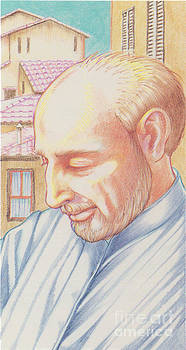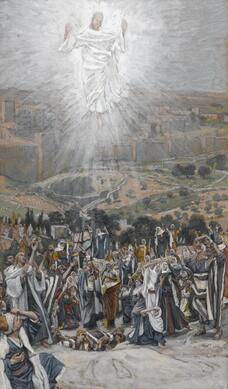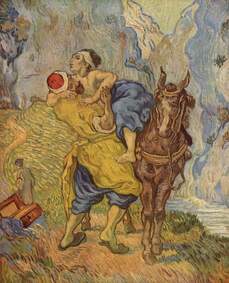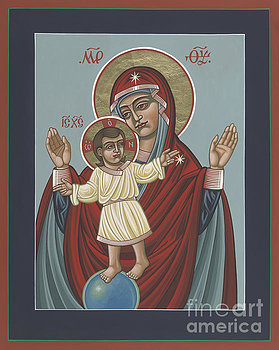 We have heard the adage that absence makes the heart grow fonder. There is truth to this when we are physically away from someone with whom we are in a relationship with a solid foundation. However, if we are totally disconnected, never thinking of the other because we are also absent mentally and emotionally, rather than making the heart grow fonder, the relationship will erode and then die out. In short, our priorities will have shifted so much that ‘the other’ ceased to be important. This behavior reveals something about the nature of that relationship in the first place, and if it is a recurring pattern, it gives light to the nature of one’s ability to commit to the work of maintaining relationships. As difficult as this is between people when it occurs, it is much more challenging when we behave like this with God. There is no substitute for God, however, and to put someone or something before Him can be disastrous.* There is none more reliable and steadfast in love than God, so the good news is that if we do move away from Him, God will always take us back. He is faithful, resilient, merciful and unchanging in His love.  Unfortunately, a consequence of sin and our brokenness is that our priorities can (and do) get ‘out of whack’ through a gradual movement away which we hardly notice. Inadvertently we fill our time with so much that we do not have time for God or prayer, or we simply become lax, such that our relationship with God suffers. At other times, we become attached to things that we put before God without even realizing it. It is good to continuously examine our relationships and priorities to make sure this is not happening, and if it is, we can take steps to change, asking the Lord to help us to do so. Something that can help is from St. Ignatius of Loyola who taught that our memory is an important tool in our spiritual life. Without memory of the graces and consolations we have previously received, we can literally forget how much we need God, how gratuitous He is, and subsequently lose sight of the great gift of the love and mercy which He freely offers. Memory helps us to better see how much God has done for us, helping us to persevere when we are challenged. St. Ignatius said to also remember the times of desolation when we did not feel God’s presence and how hollow that was; we learn to recognize that whatever we put before God cannot really satisfy our longing.  Ironically, what takes place when we fill our longings with things that fail to satisfy such as putting people, material things, or acclaim first in our lives, is that we really are longing for the only thing that can satisfy us: God. Therefore, our longing is actually a gift if we recognize it as such. A good exercise to help with this is to remember the time when we were not able to attend our churches during the pandemic. We longed to be fed and pined for the fellowship that was previously enjoyed; we longed for our brothers and sisters with whom we share in the faith, and perhaps we realized how much we need each other. Many also longed for a way to serve as they had done previously. We had no communion in any way, neither in the Eucharist nor through being present with our parish families, our worship communities. This type of longing was actually a good thing because it heightened our realization of the greatness of the gift we have been given in our faith, our brothers and sisters in our faith family, the clergy who serve so selflessly and hopefully it deepened our sense of gratitude when we returned. The reality is that longing is actually a grace when it is hope-filled. Yes, our communities here on earth are imperfect, but what we should continue to always long for is the perfected community which is to come, but of which we are already a part. Our communities are meant to be continual reminders of this.  The last thing we hear at the end of Mass is from the deacon, a reminder of Jesus’s commission to make disciples: “Glorify the Lord with your life.” We glorify the Lord when we build the Kingdom, thus we are being reminded that the liturgy is meant to continue through us as we bring Jesus outward in our service. Those words echo Jesus’ commission when He told the apostles to “make disciples of all nations, baptizing them in the name of the Father, the Son, and the Holy Spirit, teaching them to observe all that I have commanded you….” (Matthew 28: 18-20)** That is, the last thing Jesus told His disciples prior to His Ascension is that we are to build the Kingdom by word and deed. Our humble acts of love and mercy will draw others to Him and this, of course, glorifies God. Perhaps we can reflect upon what it means to be such a disciple, asking ourselves whether or in what ways we are glorifying the Lord with our lives. It would also be good to reflect upon the gift of our church families. We have a great gift in our worship communities because we find God in our rituals and in the brothers and sisters who form our extended family. Let us rejoice in this gift as we look forward to the day when we will be gathered together in Heaven.  May we have faith in God and always seek to be united with Him! May we never cease to long with hope for a deeper relationship with the Lord! May we glorify the Lord with our lives! And may we be filled with gratitude for our faith communities in the One Body of Christ! Let us meet in the Heart of Jesus! Peace! ©Michele L. Catanese * When we look for happiness outside of God not only can we get further from Him, but we can come to spiritual and even physical harm. To put nothing before God was given to us as the first of the 10 Commandments given by God out of love and care for His children. God knows that only the power of His mercy and love can save us. All else will tempt us with hollow lies, but they are, in fact, just that: lies. All we have to do is look to the stories in the Old Testament to see how many times the people got in trouble because they tried to find a substitute for God. All those instances ended in disaster. Only when they listened to God did they find peace and prosperity. ** See the entire passage: Jesus told the apostles to “make disciples of all nations, baptizing them in the name of the Father, the Son, and the Holy Spirit, teaching them to observe all that I have commanded you.” This means we are to live the gospel He taught and thereby evangelize in word and deed, building up the Body of Christ. But notice how He prefaced this commission: “All power in heaven and on earth has been given to me. Go therefore….” This implies that He shares His power with us, that is, the grace to live the commission that He then stated. And after He gave the commission, Jesus concluded by saying “And behold, I am with you always, until the end of the age.” (Matthew 28: 19-20) Everything we do includes Him, and He will help us see it through. Images: 1. My photo, sunrise at 39,000 feet, taken from a plane as we were flying into Denmark. 2. Drawing, St. Ignatius at Prayer in Rome, by Fr. William Hart McNichols. If you would like to purchase a copy of this drawing you can find it at fineartamerica.com/featured/st-ignatius-at-prayer-in-rome-william-hart-mcnichols.html 3. My photos, on the banks of a fjord in Norway. 4. Painting, The Ascension of Jesus by James Tissot. 5. My photo, a sunset in my neighborhood. Note: In compliance with GDPR rules, I wish to make it clear that I do not gather any information on any of my readers at any time.  God is the Infinite One God is the Infinite One Sometimes the depth of the mercy and love of God can boggle our mind. I remember a conversation I had with someone who really struggled with it. She became quite animated, saying that she simply could not understand how God could be so forgiving or how He could love so much, and that it made no sense to her. It seemed to me that she was a lot closer to the truth of God’s mercy than she realized. This is because God’s love is completely incomprehensible and unfathomable; there is no way we can know its depths because God cannot be encapsulated into a description or definition. God is the infinite One, who therefore is limitless in His mercy: He is love and He is mercy. On the other hand, our minds are limited, and so we simply cannot ever understand this great and wonderful mystery. Thus, we should be overwhelmed and awed by the mercy of God. Rather than trying to conceptualize this reality, it is better to experience it through a relationship with Him, letting Him reveal His love as He will, allowing it to penetrate our hearts, forming us into people of love and mercy. Therefore, instead of ‘spinning our wheels’ trying to understand the unknowable, it is better to gratefully accept it as a gift beyond description, and then rejoice in it.*  God does not do things as humans do God does not do things as humans do There are many reasons why we struggle to accept the reality that God’s mercy is so great. Sometimes it is because we experience guilt as a result of our sin, a temptation that gives rise to feelings that we do not deserve His forgiveness or mercy.** No matter how ‘bad’ or serious we think our weaknesses, sins, or past actions have been, refusing to forgive ourselves is refusing God’s love. By doing so we are (wittingly or unwittingly) acting as if we know better than God. We are deciding that our judgment is more accurate than His by condemning ourselves when all God wants to do is set us free! The reality is that He forgives us much more readily than we forgive ourselves. In the Gospels, Jesus told Peter and the other apostles that they were to forgive someone 77 times (or 70 x 7 times) which basically means that we are to forgive without limit. He taught that this is so because God forgives us that way. Just think of how many sins all the people of the world have committed throughout history. If it could be counted, the number would be far greater than 77 times for each person, and yet, God never ‘runs out’ of mercy. This limitless mercy is a consistent theme in the teaching of Jesus and is often found in His parables, such as the Lost Son, the Good Samaritan, and the Unforgiving Servant. (Luke 15; Matthew 18:21-35) One that is particularly pointed in revealing that God does not do things as humans do is the parable of God’s generosity: the workers who are all paid equal amounts even though they do not work the same amount of time. (Matthew 20:1-16) This shows that God’s wisdom, as well as the mercy that flows from it, is so great that it is far beyond anything we can comprehend.  "God's mercy is greater than our misery" "God's mercy is greater than our misery" St. Faustina (the saint of God’s mercy), repeatedly referred to the ‘oceans of mercy’ with which God is filled. In her Diary she wrote, “Let no one doubt concerning the goodness of God; even if a person's sins were as dark as night, God's mercy is stronger than our misery.” She continued, “One thing alone is necessary: that the sinner set ajar the door of his heart, be it ever so little, to let in a ray of God's merciful grace, and then God will do the rest.” (#1507) St. Faustina was describing how God’s mercy is healing and that it can change our lives little by little, or even all at once, as God sees fit. She went on to say that while our sins are why Jesus suffered so much in the Garden of Gethsemane, He still accepted them all and carried it to the Cross in order to redeem us. Therefore, to refuse His mercy because it seems too good to be true is to rob ourselves of the entire point of why He came. And even if we do deny His mercy, God is unrelenting: He will continue to offer it anyhow, especially when we see Him face to face at the end of our life.  the Rosary and the Chaplet of Divine Mercy are the two most powerful weapons we have the Rosary and the Chaplet of Divine Mercy are the two most powerful weapons we have The Chaplet of Divine Mercy (given to St. Faustina by Jesus) is a beautiful and powerful prayer that I suggest we make part of our daily prayer.*** I have heard that the Rosary and the Chaplet of Divine Mercy are the two most powerful weapons we have against the powers of evil. I also believe that the more we pray the Chaplet, the more we meditate on God’s mercy, and the more we meditate on God’s mercy, the more we open ourselves up to offering that mercy to others, too. Mercy is at the heart of Christian love and it is a hallmark of discipleship. Perhaps we can spend time meditating on Divine Mercy, praying the Chaplet, and asking for the grace to be filled with the mercy and love of God, especially when we are most challenged by evil, disappointment, or betrayal. If we experience mercy rather than trying to understand it, we are more likely to become channels of it, allowing mercy to transform us into humble disciples. When we do this, we grow in holiness, becoming filled with gratitude in knowing this kind of love is only possible through Him.  may we be open to the Divine Mercy of God may we be open to the Divine Mercy of God May we be open to the Divine Mercy of God so that our lives are transformed! May we ask the intercession of St. Faustina that we might receive the merciful healing graces we need! And may we become people of mercy and love! Let us meet in the merciful heart of Jesus! Peace! ©Michele L. Catanese Notes: * I like this description of mystery: “It is not the human mind that grasps God: the divine majesty grasps us.” (A Concise Dictionary of Theology by Gerald O’Collins, SJ and Edward G. Farrugia, SJ ** To be clear, guilt is not helpful because it usually is a response in which we tear ourselves down or carry a burden we refuse to let go of. Rather, sorrow for our sin is a freeing response. Guilt is anger turned against ourselves such that we ‘beat ourselves up’ about what we have done, etc. Sorrow is when we have remorse, a desire to not sin in the same way again because we have offended God. In guilt we turn inward; in sorrow we turn outward, desiring to be healed, to grow because of our love of God. *** The Chaplet of Divine Mercy: https://www.thedivinemercy.org/message/devotions/pray-the-chaplet Finally, here is a prayer composed by St. Faustina that is a wonderful way to pray for the grace of mercy. A Prayer of St. Faustina May the greatest of all divine attributes, that of Your unfathomable mercy, pass through my heart and soul to my neighbor. Help me, O Lord, that my eyes may be merciful, so that I man never suspect or judge from appearances, but look for what is beautiful in my neighbors’ souls and come to their rescue. Help me, that my ears may be merciful, so that I may give heed to my neighbors’ needs and not be indifferent to their pains and moanings. Help me, O Lord, that my tongue may be merciful, so that I should never speak negatively of my neighbor, but have a word of comfort and forgiveness for all. Help me, O Lord, that my hands may be merciful and filled with good deeds, so that I may do only good to my neighbors and take upon myself the most difficult and toilsome tasks. Help me, that my feet may be merciful, so that I may hurry to assist my neighbor, overcoming my own fatigue and weariness (…) Help me, O Lord, that my heart may be merciful so that I myself may feel all the sufferings of my neighbor. (…) May Your mercy, O Lord, rest upon me.” (#163, Diary of Saint Maria Faustina Kowalska: Divine Mercy in My Soul) https://divinemercy.life/the-prayers-of-saint-faustina/#:~:text=May%20the%20greatest%20of%20all,and%20come%20to%20their%20rescue Images: 1. My photo of a rain cloud coming in over the ocean at Grand Cayman. 2. Painting, The Good Samaritan by Vincent van Gogh. 3. Photo of St. Faustina Kowalska. I love her wry smile in this photo. 4. Icon, Mary Mother of Mercy (Dedicated to Pope Francis in the Year of Mercy) by Fr. William Hart McNichols. You can find this at fineartamerica.com/featured/mary-mother-of-mercy-dedicated-to-pope-francis-in-this-year-of-mercy-289-william-hart-mcnichols.html 5. Painting, Divine Mercy. This was the image St. Faustina had painted at Jesus instructions. It is how she saw Him. Note: In compliance with GDPR rules, I wish to make it clear that I do not gather any information on any of my readers at any time. |
Heart Speaks to Heart
|

 RSS Feed
RSS Feed

